7 Ways to Get Into a College in Canada Without IELTS (2025 Guide for Nigerians)

The International English Language Testing System (IELTS) exam often stands as a major roadblock for many Nigerians planning to study abroad. The high cost of the exam (over ₦100,000), the intense pressure of preparation, and the anxiety of achieving the required band score can be incredibly discouraging, sometimes even halting the "japa" process before it truly begins.
But what if you could sidestep this hurdle completely? The great news is that you can. Many Canadian institutions now recognise the challenges students face and have created flexible pathways to prove English proficiency. This means your dream of finding a college in Canada without IELTS is more achievable than ever before.
This guide is your direct, no-fluff roadmap. We've compiled a comprehensive list of colleges, application platforms, and alternative tests that allow you to bypass the IELTS requirement. We will explore each option in detail, outlining the specific entry requirements, alternative language tests accepted (like the Duolingo English Test), and unique pathway programmes designed for international students.
Forget generic advice. This article provides actionable steps and practical examples tailored for a Nigerian applicant. We will show you exactly how to navigate the application process for your 2025 intake, complete with screenshots and direct links to the resources you need. Let’s remove the IELTS barrier and get you one step closer to your Canadian study and career goals.
1. EduCanada (Government of Canada)
When you are starting your search for a college in Canada without IELTS, your first stop should always be the official source: EduCanada. This is the Government of Canada’s official website for international students, which means the information you find here is the most trustworthy and up-to-date available. Think of it as the foundation for your entire application journey, providing the official rules and direct links you need to succeed, free from any "agent" fees or misinformation.
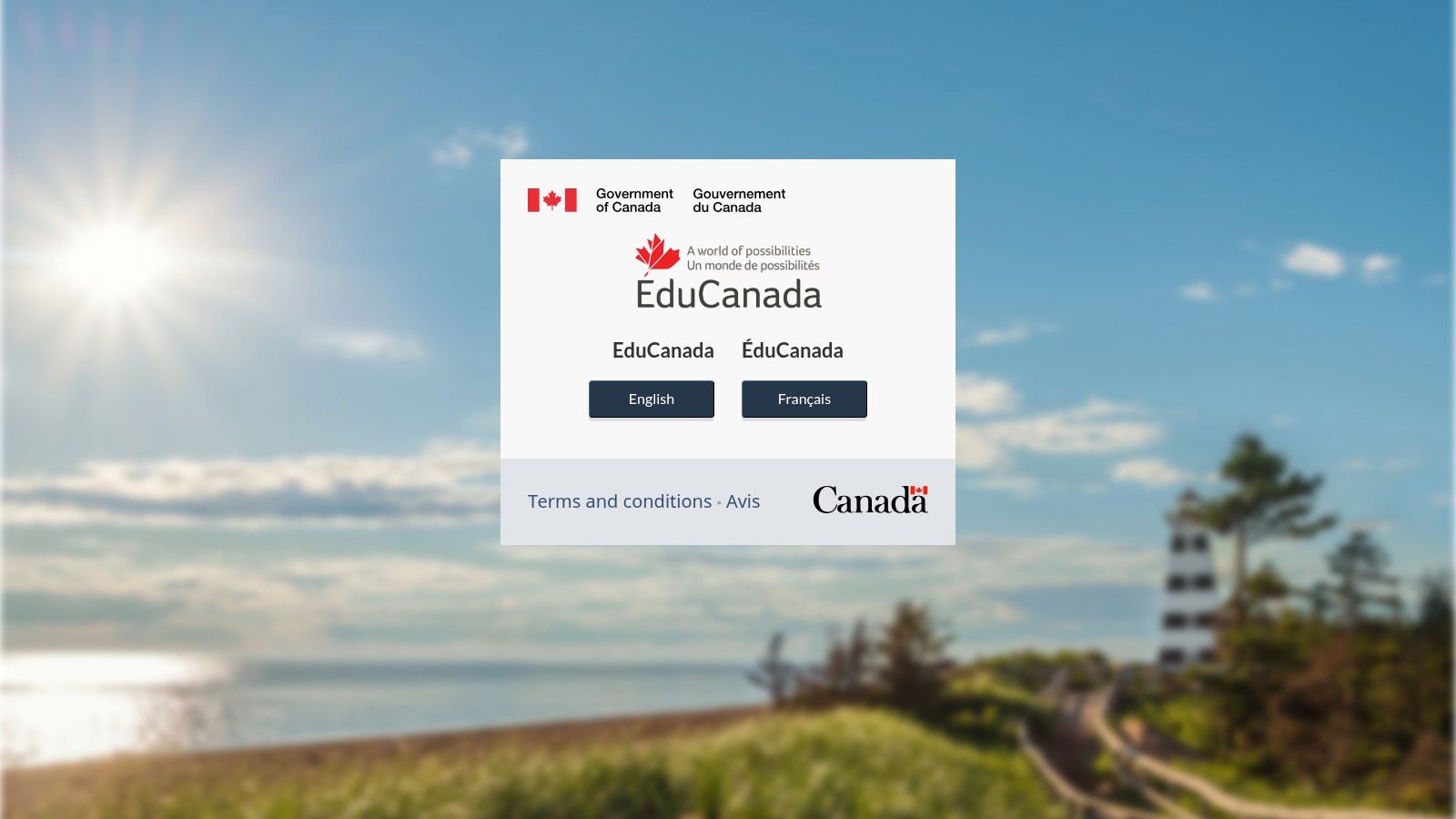
Unlike agents or third-party sites that might have their own agendas, EduCanada gives you direct, unfiltered information from the Canadian government itself. This is crucial for verifying admission requirements and understanding the student visa (study permit) process. The website offers comprehensive guides on the Canadian education system, helps you compare different provinces and territories, and provides directories of designated learning institutions (DLIs)—the only schools that can get you a study permit.
How to Use EduCanada for Your No-IELTS Search
While EduCanada doesn’t have a specific filter to show only colleges that waive IELTS, it serves a more important purpose: it is the most reliable directory to find official college websites. Your goal here is to build a list of potential colleges and then visit their sites to verify their specific English language proficiency requirements.
Here is a practical step-by-step guide:
- Explore Provinces: Use the "Find a school" tool to browse colleges by province. For example, you might look at colleges in Ontario or Manitoba, which are popular choices for Nigerians.
- Identify Colleges: Note down the names of public colleges that interest you.
- Visit Official Websites: Use the direct links on EduCanada to go to each college's official admissions page. This is where you will find the most accurate information on alternatives to IELTS.
Pro Tip: Look for an "English Language Proficiency" or "Admission Requirements for International Students" page on the college's website. This is where they list accepted alternatives like Duolingo English Test, TOEFL, PTE, or even a waiver if you have a good grade (like a B3 or higher) in your WAEC/NECO English.
What Makes EduCanada Stand Out?
| Feature | Description |
|---|---|
| Authoritative Information | As a government source, it provides official guidance on study permits, post-graduation work permits (PGWP), and DLI status. |
| Comprehensive School Directory | It lists all designated learning institutions, ensuring you only apply to schools that are authorised to accept international students. |
| Scholarship Database | Includes a searchable database of scholarships available to international students, helping you fund your education. |
| Free Access | The platform is completely free to use, with no hidden fees or charges for accessing its resources. |
Although you cannot apply directly through the site, its role is to empower you with official information. It ensures you avoid scams and get the correct details needed for a smooth process. Combining the resources here with a broader understanding of the move is crucial, and you can find more insights on how to successfully relocate to Canada from Nigeria.
Website: https://www.educanada.ca
2. ApplyBoard
After using the official government resources, your next step can be a platform like ApplyBoard, a large, centralised application marketplace. It is especially popular among Nigerian students looking for a more streamlined way to find and apply to a college in Canada without IELTS. Think of it as a supercharged search engine specifically designed for international students, allowing you to filter programmes based on your qualifications and preferences.
ApplyBoard partners with hundreds of Canadian colleges and universities, bringing their admission requirements into one searchable database. This is a massive time-saver compared to visiting each college website individually. You can create a single profile, upload your WAEC/NECO results and transcripts once, and apply to multiple schools, making the entire process far more efficient.
How to Use ApplyBoard for Your No-IELTS Search
ApplyBoard’s key advantage is its powerful filtering system, which lets you find programmes that accept alternatives to IELTS. Many Nigerian students have successfully used it to discover colleges that accept the Duolingo English Test, which is often more accessible and affordable.
Here’s how you can use the platform effectively:
- Create a Profile: Sign up and build your academic profile, including your WAEC/NECO results and any other qualifications.
- Filter Programme Search: When searching for programmes, use the filters to specify your English proficiency test. You can select options like "Duolingo," "PTE," "TOFFL," or even indicate you plan to complete a pathway programme.
- Discover Pathway Programmes: The platform clearly lists colleges offering English for Academic Purposes (EAP) or pathway programmes. Completing one of these can grant you direct admission into your chosen diploma or degree without needing any other English test.
- Submit Applications: You can manage and submit applications to multiple colleges directly through the platform, tracking their status in one central dashboard.
Pro Tip: While ApplyBoard simplifies the search, always double-check the requirements on the college's official website before paying any application fees. Sometimes, specific programme requirements can change, and the official site remains the final authority.
What Makes ApplyBoard Stand Out?
| Feature | Description |
|---|---|
| Centralised Application | Use a single profile and document set to apply to numerous Canadian colleges, saving significant time and effort. |
| Advanced Filtering | Easily find programmes that accept alternatives like Duolingo, PTE, and TOEFL, or that offer IELTS waivers via pathway programmes. |
| Wide Coverage | The platform partners with a vast network of Canadian Designated Learning Institutions (DLIs), giving you a broad selection. |
| Free to Use for Students | Students can browse programmes and submit applications for free; ApplyBoard receives its commission from the institutions. |
While the initial application is done on ApplyBoard, you may need to complete final steps or create a student account on the college's own portal after receiving an offer. Its primary strength lies in simplifying the discovery and initial application phases, making it an invaluable tool for finding your ideal college in Canada without IELTS.
Website: https://www.applyboard.com
3. OntarioColleges.ca (OCAS)
If you have set your sights on studying in Ontario, the economic powerhouse of Canada, then OntarioColleges.ca is an essential platform to master. This is the official, centralised application service for all 24 public colleges in the province, including well-known institutions like Seneca, Humber, and Centennial College. For a prospective Nigerian student, this simplifies the application process immensely, allowing you to apply to multiple colleges through a single portal.
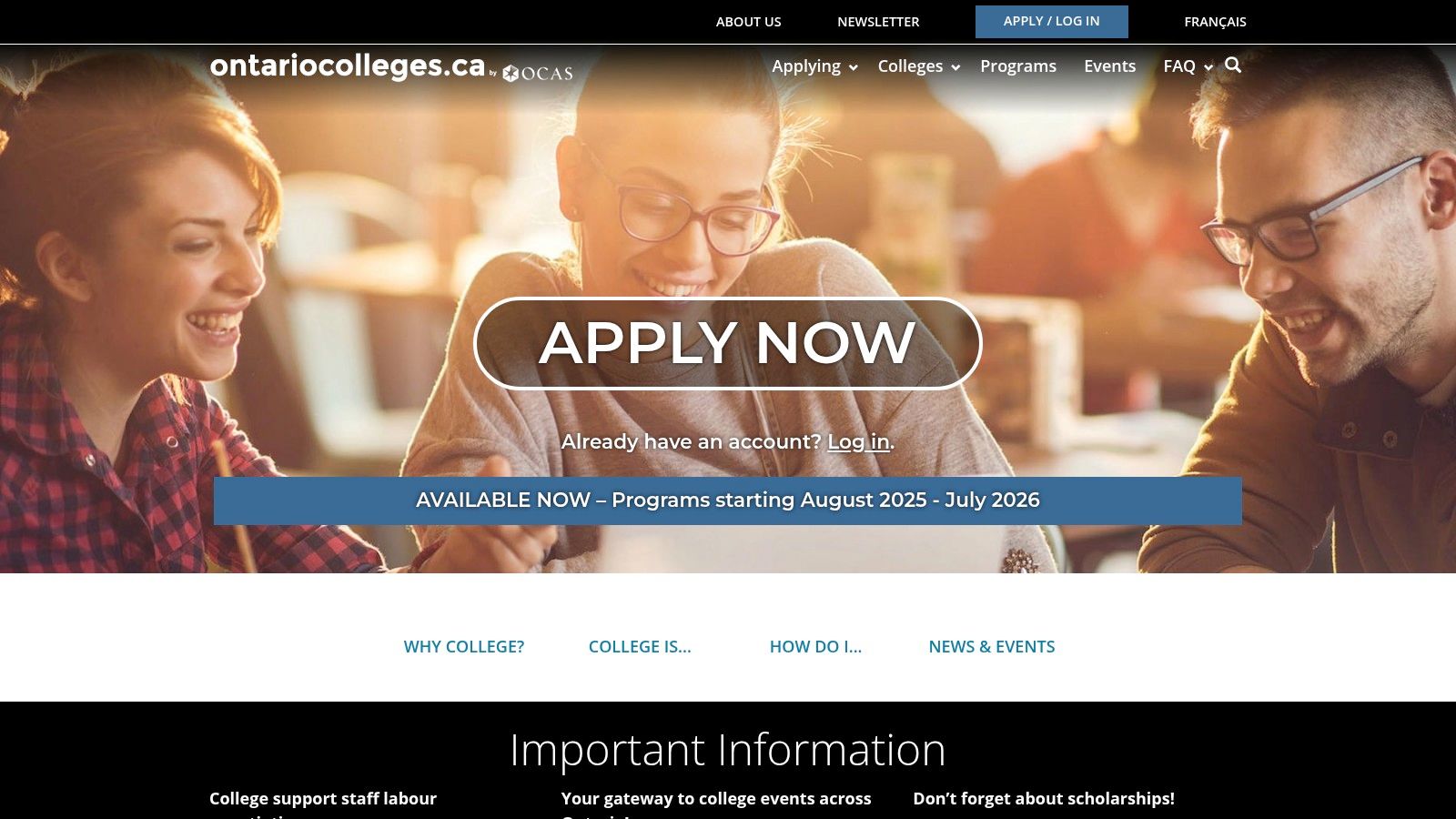
Think of it as the JAMB or WAEC portal, but specifically for Ontario's public colleges. Instead of navigating dozens of different application systems, you create one account, upload your documents once, and manage all your applications and offers in one place. This is particularly useful when searching for a college in Canada without IELTS, as many Ontario colleges are known for their flexibility in accepting alternative English proficiency proofs.
How to Use OntarioColleges.ca for Your No-IELTS Search
While the portal itself doesn't have a filter for "no-IELTS" options, it is the direct gateway to submitting the alternative documents these colleges accept. The strategy here is to first identify colleges with flexible requirements and then use OCAS to execute your application efficiently.
Here is a practical step-by-step guide for a Nigerian applicant:
- Research Colleges First: Before logging onto OCAS, visit the individual websites of Ontario colleges like Conestoga, George Brown, or Sheridan. Check their international admission pages for English proficiency alternatives like Duolingo, TOEFL, PTE, or their own EAP pathway programmes.
- Create Your OCAS Account: Register on the OntarioColleges.ca international applicant portal.
- Submit Your Application: Select up to five programmes you wish to apply for (a standard C$110 fee applies). This is where you will upload your WAEC/NECO results, transcripts, and passport.
- Upload Proof of Proficiency: When it comes time to submit your English test results, you will upload your Duolingo, TOEFL, or other accepted test score instead of an IELTS certificate.
Pro Tip: Many Ontario colleges offer "English for Academic Purposes" (EAP) or pathway programmes. You can often apply for these directly through OCAS. Successful completion of the EAP programme typically guarantees admission into your chosen diploma or degree programme without needing any other English test.
What Makes OntarioColleges.ca Stand Out?
| Feature | Description |
|---|---|
| Centralised Application | Apply to up to five programmes across Ontario’s 24 public colleges with a single application and fee, saving time and effort. |
| Secure Document Hub | Provides a secure, official channel to upload and route your academic transcripts and proof of English proficiency directly to the colleges. |
| Transparent Process | Clearly outlines application deadlines, programme availability, and fees. You can track your application status and accept offers directly on the portal. |
| Official Gateway | As the official service, it eliminates the risk of dealing with unverified third-party agents and ensures your application is received and processed correctly. |
Although some colleges may direct international students to apply directly on their own websites, the majority utilise OCAS, making it an indispensable tool. It streamlines the entire process, from document submission to paying fees and accepting your admission offer, putting you in control of your journey to a college in Canada without IELTS.
Website: https://www.ontariocolleges.ca
4. Duolingo English Test (DET)
The Duolingo English Test (DET) has quickly become one of the most popular and convenient alternatives for students looking to study at a college in Canada without IELTS. As a fully online test, it offers a flexible and accessible way to prove your English proficiency from the comfort of your home in Nigeria. Its modern, adaptive format and fast results make it an excellent choice for applicants working with tight deadlines.
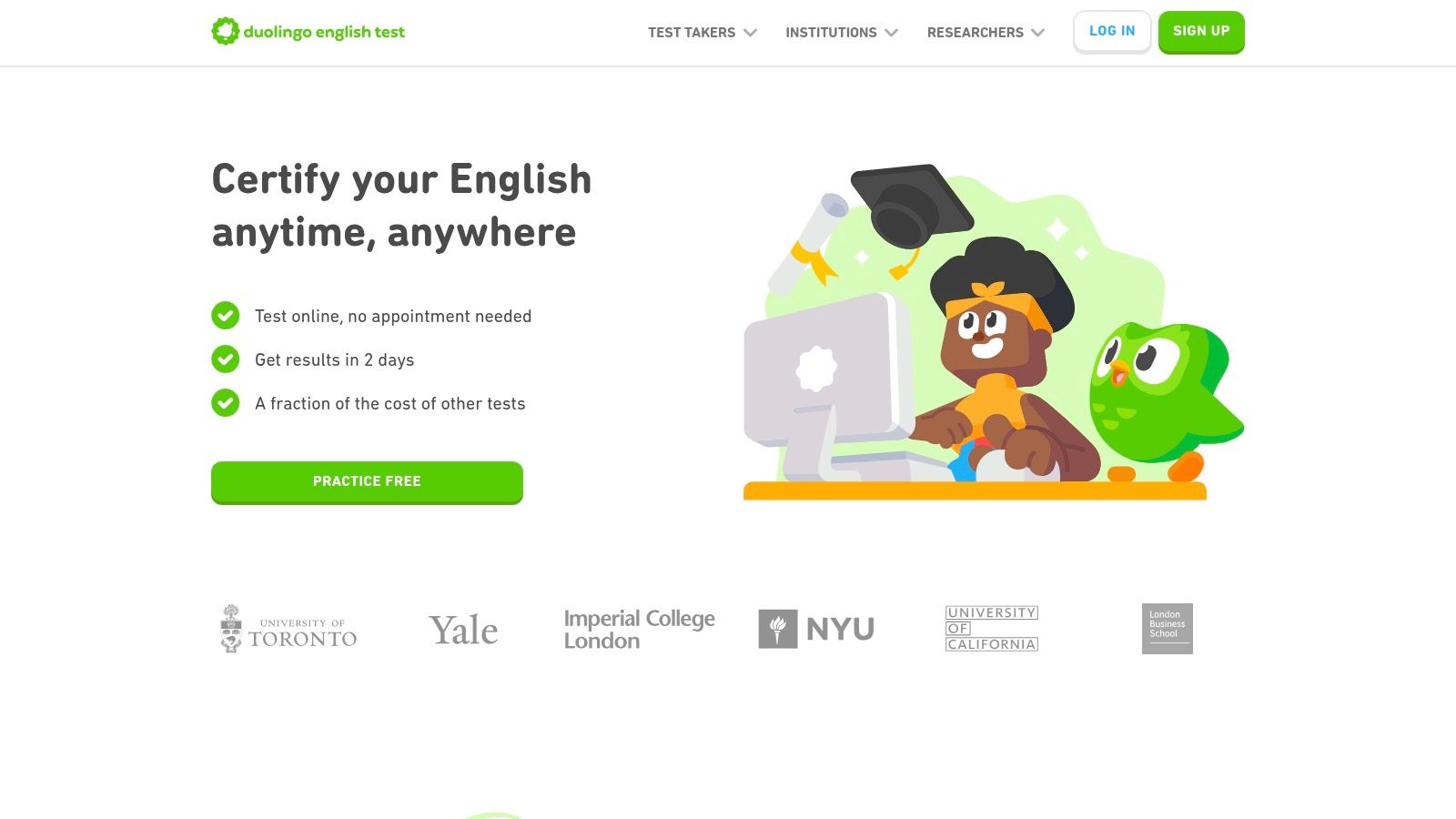
Unlike traditional tests that require you to book a spot at a physical test centre weeks or months in advance, the DET allows you to take the test anytime, anywhere. This is a significant advantage for Nigerian students who may not live near major cities like Lagos or Abuja. The test takes about one hour to complete, and you receive your certified results within 48 hours, allowing you to quickly send your scores to multiple institutions at no extra cost.
How to Use the DET for Your No-IELTS Application
The Duolingo English Test website is more than just a testing platform; it is a resource hub. You can use it to confirm which Canadian colleges accept the test and what their minimum score requirements are. This helps you target your applications effectively and avoid wasting time and money on schools that do not recognise the DET.
Here’s a practical step-by-step guide to using the DET website:
- Check Accepted Institutions: Before taking the test, use the official search tool on the DET website to find a list of Canadian colleges that accept its scores.
- Take a Practice Test: The website offers a free, 15-minute practice test. This helps you get familiar with the test format and question types before you commit to the paid version.
- Complete the Official Test: Once ready, you can pay for the test (around $65 USD, much cheaper than IELTS) and take it online. Ensure you have a stable internet connection, a quiet room, and a valid ID like your international passport.
- Send Your Scores: After receiving your results, you can send them directly to as many colleges as you want through your Duolingo account, free of charge.
Pro Tip: While the DET is widely accepted for admission, it is not currently accepted for Canada’s Student Direct Stream (SDS) visa applications. Nigeria is eligible for the SDS route, which offers faster study permit processing, but you must submit an IELTS score for it. If you choose DET, you will apply through the regular study permit stream.
What Makes the Duolingo English Test Stand Out?
| Feature | Description |
|---|---|
| Online & On-Demand | Take the test from home at any time, eliminating the need for travel to a test centre. |
| Fast Results | Certified results are delivered within 48 hours, perfect for last-minute applications. |
| Cost-Effective | The test is significantly cheaper than IELTS or TOEFL, and you can send your results to unlimited schools for free. |
| Adaptive Technology | The test difficulty adjusts in real-time based on your answers, providing a precise assessment of your ability in a shorter time. |
The DET is a powerful tool for demonstrating your English skills, but it's essential to understand its place in the overall application process. To get a complete picture, it's wise to learn more about the broader Canada student visa requirements to ensure all your documents are in order.
Website: https://englishtest.duolingo.com
5. ILAC University Pathway
If you find that your English test scores are a barrier or you simply prefer a more structured approach to meeting language requirements, the ILAC University Pathway is an excellent solution. This programme is not a college itself, but rather a preparatory English course that, upon successful completion, grants you direct entry into one of over 100 partner colleges and universities across Canada without needing to submit an IELTS or TOEFL score. For many Nigerian students, this is a popular and reliable route.
ILAC's programme is designed to prepare you for the academic rigour of a Canadian classroom, focusing on skills like essay writing, presentation delivery, and research. Instead of just studying for a test, you build the practical language skills you will use every day in your diploma or degree programme. This approach provides a solid foundation for academic success long after you have been admitted.
How to Use the ILAC Pathway for Your No-IELTS Search
The ILAC University Pathway is a strategic choice for students who want a guaranteed entry route. You can secure a conditional offer from a Canadian college even before you finish your English studies, giving you peace of mind.
Here is a practical step-by-step guide:
- Explore Partner Institutions: Visit the ILAC Pathway website to view their extensive list of partner colleges and universities. You can find popular institutions like Seneca College, Fanshawe College, and Georgian College on this list.
- Apply for a Pathway Programme: You will first apply to ILAC for their University Pathway programme. During this process, ILAC’s academic advisors will help you choose a college and programme that aligns with your career goals.
- Receive a Conditional Letter of Acceptance: Once you are accepted into the ILAC pathway, you can apply to your chosen Canadian college. The college will issue a Conditional Letter of Acceptance (CLoA), which states that your admission is guaranteed once you successfully complete the required ILAC English level.
- Complete the Pathway and Begin Your Studies: After finishing your English programme at ILAC, you transition directly into your main academic programme at the partner college without needing any further English tests.
Pro Tip: Using the ILAC Pathway can strengthen your study permit application. The conditional acceptance letter from a Canadian DLI, combined with your enrolment at ILAC, demonstrates a clear and credible study plan to immigration officers.
What Makes the ILAC University Pathway Stand Out?
| Feature | Description |
|---|---|
| IELTS/TOEFL Waiver | Successful completion of the required pathway level guarantees you meet the English proficiency requirement for over 100 partner institutions. |
| Conditional Acceptance | You can receive a conditional offer from your desired college before you even arrive in Canada, which helps secure your study plans. |
| Dedicated Pathway Specialists | You get one-on-one support from advisors who help you choose the right college, navigate the application process, and ensure a smooth transition. |
| Academic Skills Training | The curriculum focuses on practical skills needed for success in a Canadian academic environment, not just test-taking strategies. |
While this option requires an upfront investment in time and tuition for the English course, it provides a clear, supportive, and structured path to a college in Canada without IELTS. For students who want to build their confidence and academic English skills before starting a demanding diploma programme, it is one of the most effective strategies available.
Website: https://www.ilac.com/pathway/
6. Fraser International College (FIC)
For students aiming for a top-ranked university like Simon Fraser University (SFU) but need an alternative entry route, Fraser International College (FIC) is an excellent platform to explore. FIC specialises in pathway programmes, offering a foundational bridge for international students to transition seamlessly into degree studies at SFU. This makes it a strategic choice for finding a college in Canada without IELTS, as its admission process is designed specifically for international applicants.
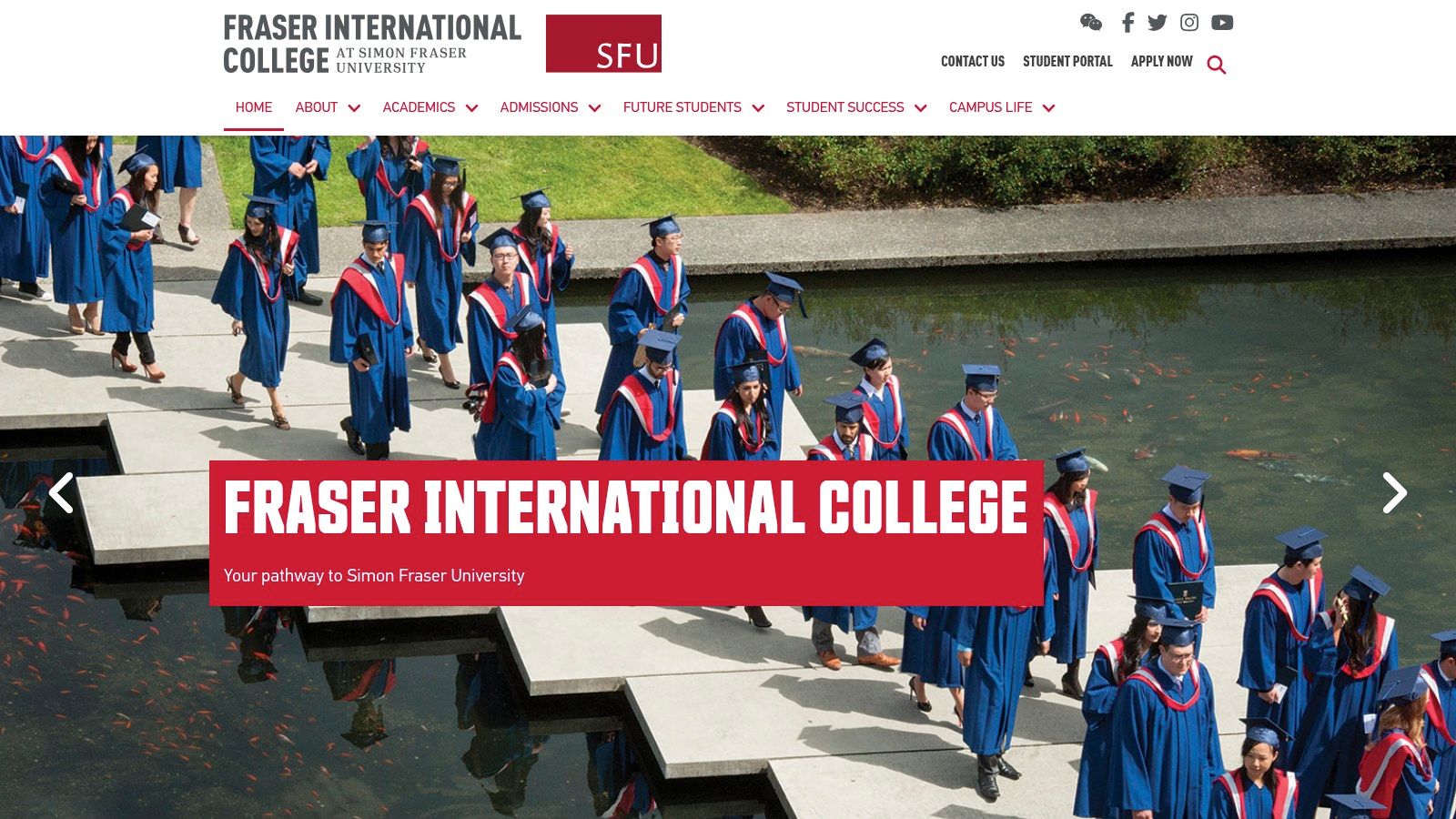
Unlike applying directly to a large university where you might feel like a small fish in a big pond, FIC provides a supportive environment with smaller class sizes, helping students adapt to the Canadian education system. Their website clearly outlines a variety of English language proficiency alternatives, making it easy for Nigerian students to see if their existing qualifications meet the criteria. This transparency removes the guesswork often associated with university admissions.
How to Use the FIC Website for Your No-IELTS Search
The FIC website is straightforward and built to guide international students through their specific pathway options. It’s not just an information portal; it’s a direct application tool that clearly lists its non-IELTS entry requirements.
Here is how to navigate it effectively:
- Go to Admissions: Find the "Admissions" section on the main menu.
- Select "English Language Requirements": This page is your most important resource. FIC lists all the tests and qualifications it accepts.
- Check for Accepted Tests: Look for familiar alternatives like the Duolingo English Test (DET), TOEFL, or PTE. They also list conditions for waivers, such as previous education in an English-speaking country.
- Review Programme-Specific Scores: Note the different score requirements for their UTP Stage I (foundation) and UTP Stage II (first-year university equivalent) programmes.
Pro Tip: If you have taken the WAEC/WASSCE, check FIC’s country-specific requirements. A strong grade in English (often B3 or higher) may be considered, though it is best to confirm this directly with an admissions advisor through the website.
What Makes Fraser International College Stand Out?
| Feature | Description |
|---|---|
| Direct Pathway to SFU | Guarantees progression to Simon Fraser University upon successful completion of the pathway programme, a major advantage. |
| Multiple IELTS Alternatives | Officially accepts a wide range of tests, including Duolingo (DET), PTE, and TOEFL, with clear minimum scores published online. |
| Tiered Entry System | Offers different entry points (UTP Stage I & II) based on your academic and English proficiency levels, providing flexibility. |
| Supportive Learning Environment | Smaller class sizes and dedicated support services help international students adjust to Canadian academic expectations before entering a large university. |
While FIC is an excellent route, remember that it is a pathway provider. This means you will spend your first year (or more) completing the FIC programme before transitioning to SFU. This involves tuition fees for the pathway itself, but it provides a structured and reliable method to enter a top Canadian university without needing an IELTS score.
Website: https://www.fraseric.ca
7. Conestoga College
Conestoga College is one of Ontario’s leading public colleges and a fantastic option for Nigerian students looking for a college in Canada without IELTS. It is highly regarded for its career-focused education and has very clear, alternative pathways for proving English proficiency. This makes it a straightforward choice for applicants who may not have an IELTS score but possess other qualifications.
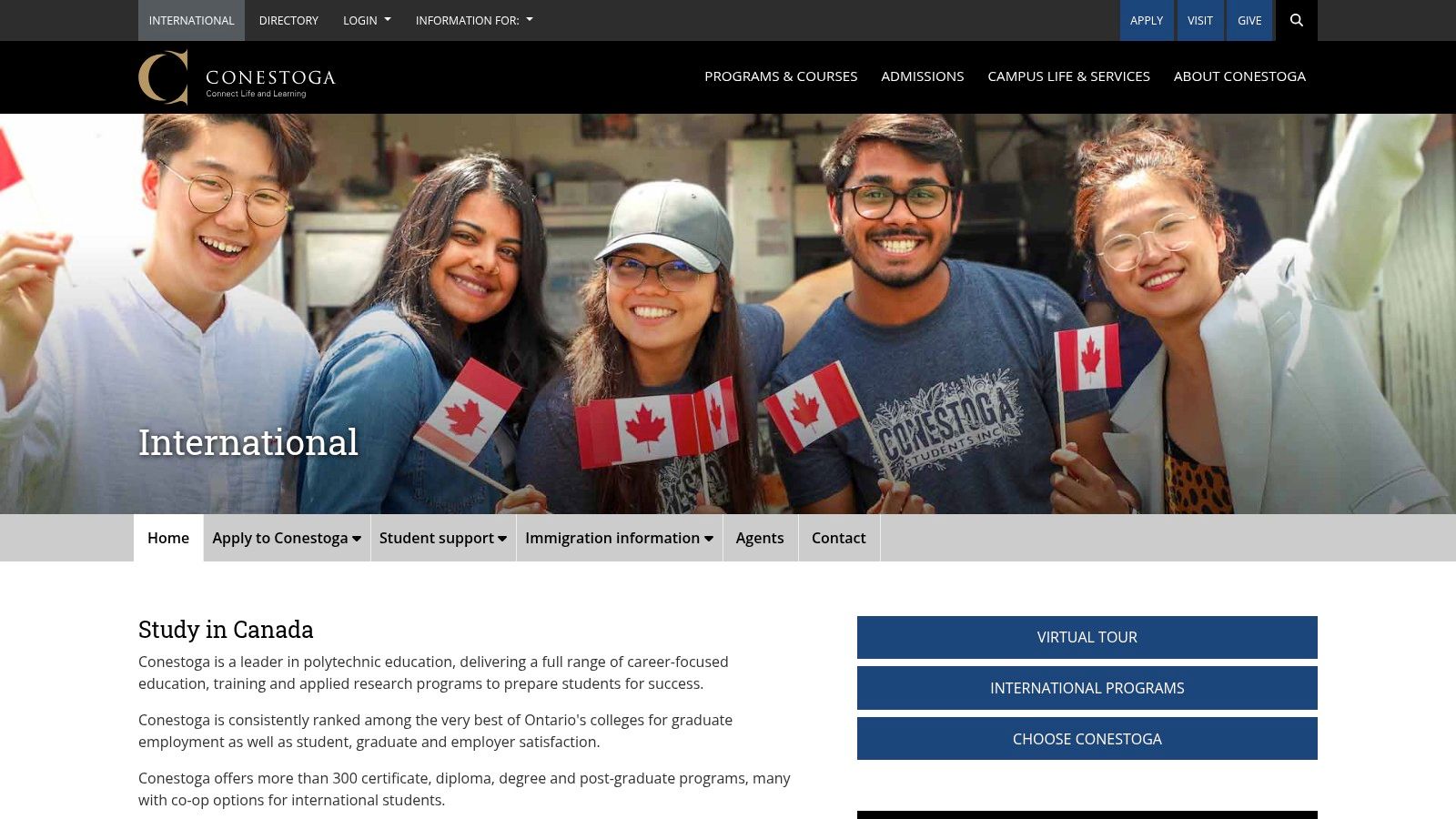
Unlike some institutions where non-IELTS options are hidden, Conestoga’s international admissions website openly lists accepted alternatives, with the Duolingo English Test (DET) being a prominent one. The college also offers its own English for Academic Studies (EAS) programme, providing a direct pathway to admission for students who need to build their language skills before starting a diploma or degree.
How to Use Conestoga's Website for Your No-IELTS Search
The Conestoga College website is designed to guide international students through the application process efficiently. It clearly outlines the steps and requirements, removing much of the guesswork.
Here is a practical step-by-step guide:
- Navigate to International Admissions: Go directly to the "International" section of the Conestoga website.
- Find "Admission Requirements": Look for the page detailing English Language Requirements. This is where you will find a list of all accepted tests and pathways.
- Check Your Programme: Search for your desired programme (e.g., Business, Engineering Technology, Health Sciences) and check its specific English proficiency requirements. Scores can vary between certificate, diploma, and degree-level programmes.
- Confirm Duolingo Scores: The website provides a detailed table showing the minimum required Duolingo English Test score for different programme types, making it easy to see if you qualify.
Pro Tip: If you don't meet the score for direct entry with Duolingo or another test, explore the English for Academic Studies (EAS) programme. Successful completion of the required level of EAS guarantees admission into your chosen academic programme without needing an external test.
What Makes Conestoga College Stand Out?
| Feature | Description |
|---|---|
| Clear Duolingo Acceptance | Conestoga publicly lists the minimum Duolingo English Test scores needed for admission to its various programmes. |
| Internal English Pathway | The English for Academic Studies (EAS) programme allows students to gain conditional admission and meet language requirements on campus. |
| High Employability | The college is well-known for its strong co-op programmes and high graduate employment rates, which is crucial for PGWP considerations. |
| Wide Programme Selection | Offers a vast range of diplomas, degrees, and certificates in high-demand fields relevant to the Canadian job market. |
As a designated learning institution, graduating from Conestoga makes you eligible for the Post-Graduation Work Permit (PGWP). Understanding the details of this is vital, and you can explore more about the Canada Post-Graduate Work Permit. While some high-demand programmes may have higher English score requirements, the transparency and multiple pathway options make Conestoga a top choice for Nigerian students.
Website: https://www.conestogac.on.ca/international
7-Option Comparison for IELTS-Free Canadian Colleges
| Item | Implementation Complexity 🔄 | Resource Requirements ⚡ | Expected Outcomes 📊 | Ideal Use Cases 💡 | Key Advantages ⭐ |
|---|---|---|---|---|---|
| EduCanada (Government of Canada) | Low – Information portal only | Minimal – Web access only | Reliable info on study programs & immigration | Initial research for international study options | Official, trustworthy govt source; free comprehensive info |
| ApplyBoard | Medium – Multi-application system | Moderate – Profile setup & application fees | Streamlined multiple applications | Searching/filtering no-IELTS program options | Wide coverage; centralized no-IELTS filters; multi-app support |
| OntarioColleges.ca (OCAS) | Medium – Single application portal | Moderate – Application fees & documentation | Manage offers from Ontario public colleges | Applying to Ontario colleges accepting English alternatives | Official Ontario gateway; supports Duolingo & EAP pathways |
| Duolingo English Test (DET) | Low – Online test, simple process | Low – Test fee only | Fast English proficiency certification | Quick, affordable English test widely accepted | Fast results; widely accepted alternative to IELTS |
| ILAC University Pathway | High – Requires program enrollment and study | High – Tuition & time investment | IELTS/TOEFL waiver upon completion | English improvement with guaranteed pathway admission | Structured route to waive English test; broad partner network |
| Fraser International College (FIC) | Medium – Pathway programs with tiered levels | Moderate – Tuition & pathway duration | Direct entry to Simon Fraser University | Focused pathway to specific university with flexible English options | Transparent English requirements; direct university progression |
| Conestoga College | Medium – Offers multiple pathways and programs | Moderate – Tuition and program fees | Diploma/degree with accepted English alternatives | Applying to varied programs with internal English support | Clear non-IELTS options; internal English pathways available |
Your Next Steps to Studying in Canada
Navigating the path to a college in Canada without IELTS can feel like a complex puzzle, but as we've explored, it is an achievable goal for Nigerian students. The journey doesn't have to be blocked by a single English proficiency test. From utilising official government resources like EduCanada to leveraging centralised application platforms such as ApplyBoard and OntarioColleges.ca, you have a powerful toolkit at your disposal.
The key takeaway is that options abound. Whether it's the accessibility and speed of the Duolingo English Test (DET), the structured academic preparation of a pathway programme like ILAC or Fraser International College, or direct admission into forward-thinking institutions like Conestoga College, there is a route tailored for your unique academic background and aspirations. The myth that IELTS is the only gateway has been debunked; what matters now is strategic planning.
Charting Your Personalised Application Strategy
Your next moves should be deliberate and well-researched. Avoid a scattergun approach where you apply to every college you see. Instead, create a focused plan based on the tools and institutions we've discussed.
Here’s a practical, step-by-step guide to get you started:
-
Self-Assessment: Begin by evaluating your academic history. Did you complete your secondary education (WAEC/NECO) or a university degree in English? If your WAEC English result is a C6 or higher, you might be eligible for an English proficiency waiver at certain colleges. Document this clearly.
-
Shortlist Creation: Use the EduCanada website as your primary, unbiased source to create a longlist of Designated Learning Institutions (DLIs). Cross-reference this list with platforms like ApplyBoard to filter for colleges that explicitly accept alternatives to IELTS, such as the DET or their own internal assessments.
-
Deep-Dive Research: For your top 3-5 choices, go directly to their official websites. Look for the "International Admissions" page and find their specific English language requirements. Note the exact DET score needed, the criteria for a waiver, or details about their pathway programmes. For instance, Conestoga College might accept a specific WAEC grade, while a college in British Columbia might prefer you to complete a pathway via Fraser International College.
-
Document Preparation: Start gathering all necessary documents immediately. This includes your WAEC/NECO certificate, university transcripts, statement of purpose, reference letters, and a valid international passport. Having these ready will save you from last-minute stress when application windows open.
Key Insight: The most common mistake applicants make is assuming all colleges have the same requirements. A successful application for a college in Canada without IELTS depends on tailoring your approach to each specific institution's policies.
Making the Final Decision and Applying
Once your research is complete, the final step is execution. If you are applying to multiple colleges within a single province, like Ontario, using a centralised portal such as OntarioColleges.ca can streamline the process immensely. It saves you from filling out repetitive information and helps you manage deadlines effectively.
Remember that your application is more than just academic records; it’s a story. Your statement of purpose should connect your past experiences in Nigeria with your future ambitions in Canada. Explain why you've chosen a particular programme and how it aligns with your career goals. This narrative can be the deciding factor for an admissions officer.
The road to studying in Canada is a journey of careful planning and proactive steps. By leveraging the right tools, understanding the various pathways, and meticulously preparing your application, you can turn your dream of a Canadian education into a reality, all without the hurdle of an IELTS exam.
Navigating the specific waiver policies and visa requirements for a college in Canada without IELTS can be tricky. For instant, personalised answers to your questions, try JapaChat, an AI immigration assistant designed for Nigerian applicants. Get clear, step-by-step guidance on your study permit application and more at JapaChat.

Leave a Reply